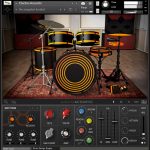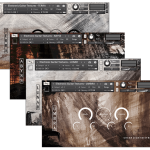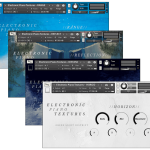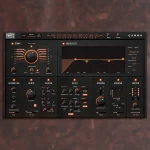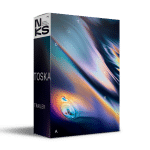Madrona Labs – Aalto 1.8.5 Crack Free Download r2r Latest Version for Windows. It is full offline installer standalone setup of Madrona Labs – Aalto 1.8.5 Crack mac for 32/64.
Madrona Labs – Aalto 1.8.5 Overview

Aalto is a semi-modular software synthesizer with an innovative, patchable UI, distinctive sounds, and a charming personality.
Aalto’s sound engine lets you create sounds that have been difficult or impossible to make with softsynths before now.
The heart of Aalto is a Buchla-inspired complex oscillator, with FM, timbre and waveshape controls that enable a wide range of expressive sounds. These sounds are uniquely malleable and alive, in part because they are made with dynamic calculation, not static wavetables.
Aalto is designed as much for sequencing patterns as for playing individual notes. Each voice has a separate, built-in sequencer with a patchable, independently controllable rate and offset. This topology makes it easy to build complex, evolving textures.
Each voice also includes a lowpass gate module with a vactrol emulation in the control path. The vactrol equation slows down the response to incoming control signals through a complex nonlinear filter. You can turn the vactrol response down to instantaneous, or up to a pronounced ring.
Following the lowpass gate is a patchable waveguide / delay module with a waveshaper and a peaking EQ built into the feedback loop. Because it has such short and controllable delay times, unlike a typical analog delay, it can be used as an additional oscillator.
Aalto’s filter is a state-variable topology with mixable simultaneous outputs, a more resonant take on the Oberheim SEM filter.
Subjectively speaking, Aalto can make a wide range of sounds, from lush to edgy, including some very complicated ones, without sounding too thick in a mix. Aalto’s sounds are not hyped or compressed, they are wide-range, open and natural. We hope our approach will appeal to experienced sound designers who have their own favorite EQs and limiters. And for those just getting into synthesis, Aalto is an accurate and honest tool for learning. We have tried to make Aalto a deep instrument that will reward lasting engagement.
Update info:
An update of Aalto and Kaivo to 1.8.5 is out, fixing a possible crashing bug introduced with 1.8.4 and optimizing file handling. Because the bug only manifested for certain users, it was an interesting one to fix and I wrote a little about it, afterwards:
All story about this update:
I got a couple reports back right away that Aalto was crashing immediately on being scanned. One person reported in that Kaivo was crashing too, but most people were not having problems with it. In short, a whole rotten gift basket of ugly issues was collected in the field, but nothing was reproducible here. This was one to sleep on.
The next morning I upgraded one of my Macs to Mojave to match a customer’s software and hardware setup exactly. Still no problems here. I spent the day reviewing code I’d just written and looking for bugs. I’d just done some fairly low-level work on timing, changing a lot of objects to use the C++ std::chrono library for their clocks. (C++ is what I use to write all the plugins, a sprawling mess of a language that can make very fast programs, used by most all audio software developers.) I found a couple of suspicious areas and spent a day on that, making the code more clear and obviously correct. Sent out an update to a few folks—same results. Guessing about what might be crashing and fixing anything suspicious is not a great way to track down bugs, but sometimes it’s all I can productively do until a better course of action becomes clear.
One of the crashes seemed to be in code that was making lists of files. What if a particular preset was causing it? So, I asked a nice Aalto user to send me their preset library. And boom! Right away the crash.
I looked at the offending C++ code, which began:
void Path::parsePathString(const char* pathStr)
{
const int pathStrBytes = strlen(pathStr);
SmallStackBuffer buf(pathStrBytes);
…
What this parsePathString does is read a raw sequence of characters in memory and turn it into a compact Path object that can refer to an object in a collection, like DSP objects in a graph, or files on disk.
The strlen function is from the old C standard library that, for better or worse, is available as part of any modern C++ toolset. It counts the number of characters in a null-terminated string—that’s some piece of text defined by where it starts in memory and containing all the bytes in the following memory until a zero is reached. Sensibly, (?) the zero is not counted as part of the length.
The text SmallStackBuffer buf(pathStrBytes) is an description of an object to be made. The presence of the <> brackets tells us the object is defined by a C++ template. Inside the brackets are the arguments to the template, and these describe a kind of variation on the theme of the basic object. In this case, SmallStackBuffer is one of my own memory utilities that holds some data in a different place depending on how much data there is. Without getting too deeply into it, if there’s a small amount of data it can go into a commonly used area called the stack, ensuring that other memory is not allocated, an operation that may lead to audio glitches. kShortFragmentSizeInChars is the constant that determines how much data will go onto the stack.
Back to the scene of the crash. The file name “Xenos Soundworks – Forbidden Experiments/MA Bass Engine (Use MW)” was being read at the time. (Check out their Soundbanks for Aalto and many other synths.) Calling the strlen function on this string returns: 64. That’s a power of two, which might be a clue, and sure enough, it turns out that 64 was the value of kShortFragmentSizeInChars. The crash starts to look like a crime scene. Time to look at what happens next, very carefully.
The next thing that happens to a 64-character file name is, it gets written to the SmallStackBuffer object—including the final null terminator which goes to location 65 out of 64, overflowing the object’s memory on the stack. The null might be written to part of another object, which could lead to the program crashing right away. Or, depending on when that other object is accessed, it might not crash for a while, which is why memory corruption like this can be so hard to diagnose.
How do we fix this? The easiest fix is very easy. Just change strlen(pathStr) to strlen(pathStr) + 1. Then there will be room for a 63-character file name and its terminator byte. Post update, go upstairs, back to celebratory bourbon. But hold up. To improve stability and efficiency over time I treat each bug as an opportunity to make all the code better, to fix not just this one instance of something having gone wrong but rather a whole class of things with the potential to go wrong. What can I learn from this mistake? Instead of just adding a +1 I’m going to look at all of my code and tests, and I’ve got four tasks ahead of me.
The first task is to look at my use of strlen across all of the code for all my plugins. If I messed up this way once, I’m likely to have done it elsewhere. Thankfully I have not used strlen many times, because of the potential for problems like this very one. The only good place to use it is in a higher-level object or function that will abstract away the confusion. Searching, I find there are only five other places in my own code where I’ve used strlen, and I can quickly verify that I’m doing the right thing in all of them.
Secondly, I’m going to look at all the code for parsePathString. Zoom out a bit. Could I have been doing this whole operation in a different way that didn’t open the door to the problem? Yes, it turns out. The stack was getting corrupted because I was writing the path string to a temporary buffer in the process of decoding it to make symbols. That was the easiest way to use the Unicode text library I’m relying on. It should be possible to do the same thing just reading the path and not writing it, which will make the program a little faster, but how to do that wasn’t clear the first time around. Digging into the library a little more deeply, I understood how to do it, and made a faster version of parsePathString that never has to allocate any heap memory at all.
Third, I’m going to add tests that could have caught this problem before it happened to anyone else. The Path object is a part of my core library madronalib and it really should be tested automatically as part of each release. Testing it with a string of length 64 is the edge case that would have caught this, so I’ll add that as well as the neighboring lengths and some weird strings like empty and badly-formed ones.
Finally, there’s a simple way I could have figured this out sooner: by having had the magic preset file in my collection to begin with! I usually have on hand only the “factory patches” I’ve made here, because when I make music I’m always making patches from scratch. But lots of people have made Aalto patches over the years and they are a bigger collection of data that might help shed light on other aspects of the code in the future. So I’ll be grabbing some sample banks to have on hand.
Every programmer I know has days like the past few, and could empathize if I’d just said “I got stuck on a stack corrupting off-by-one bug” instead of the above. I wrote this more for myself, to cement good practices, and for the non-programmers out there, to share some feeling of what it’s like to do this work. Some days it’s even more fun.
Madrona Labs – Aalto 1.8.5 Technical Setup Details
- Software Full Name: Madrona Labs – Aalto 1.8.5
- Setup File Name: Madrona Labs – Aalto 1.8.5.zip
- Setup Type: Offline Installer / Full Standalone Setup
- Compatibility Architecture: 32 Bit (x86) / 64 Bit (x64)
- Homepage:-https://madronalabs.com/products/aalto
System Requirements For Madrona Labs – Aalto 1.8.5
Before you start Madrona Labs – Aalto 1.8.5 free download, make sure your PC meets minimum system requirements.
Madrona Labs – Aalto 1.8.5 Free Download
Click on below button to start Madrona Labs – Aalto 1.8.5 Free Download. This is complete offline installer and standalone setup for Madrona Labs – Aalto 1.8.5. This would be compatible with both 32 bit and 64 bit windows.

![Madrona Labs Kaivo 1.8.5 [WIN]](https://goaudio.me/wp-content/uploads/2019/06/Madrona-Labs-Kaivo-1.8.5-crack-mac-60x60.png)
![Glitchmachines Fracture XT v1.1 VST AU [WIN-MAC]](https://goaudio.me/wp-content/uploads/2019/06/Glitchmachines-Fracture-XT-v1.1-VST-AU-crack-mac-60x60.jpg)



